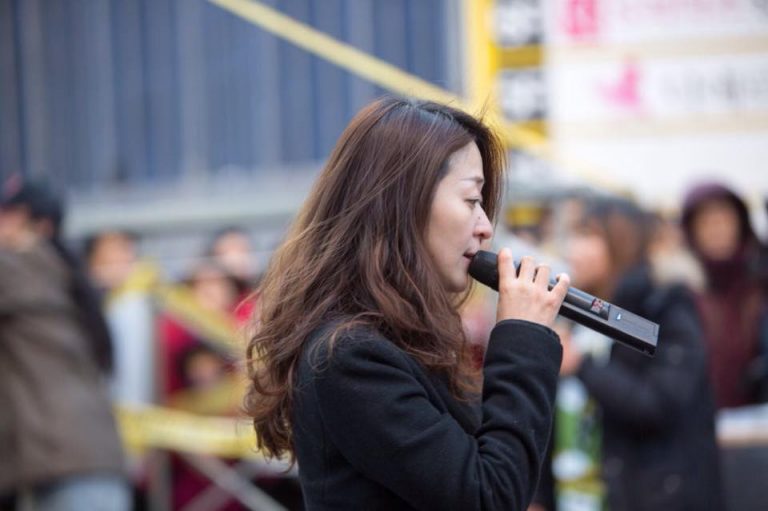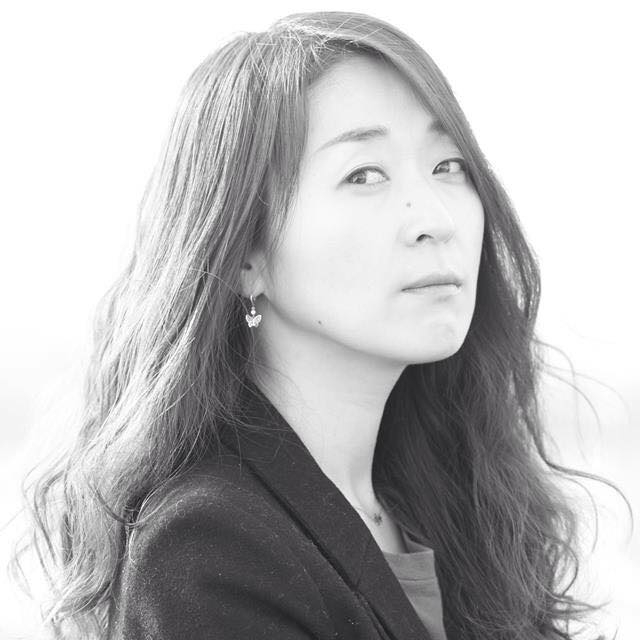At the May 18[1] memorial ceremony, which took place a short while after the Moon Jae-in administration took office, a song other than the national anthem reverberated over the grassy lawn. The song, March for the Beloved, is a protest song that is heard frequently on the streets of Korea, the sites of much social struggle. Yet, to people who have never participated in a street protest, March for the Beloved holds little meaning.
What kinds of songs are sung at Korean street protests today? Yang Hee-eun, who sang The Morning Dew, and An Chi-hwan, of Pine Tree, Green Pine Tree, were the best-known protest musicians, but after the fall of the Yusin regime they became mainstream singer-songwriters. And with time, the memories of protest artists faded. March for the Beloved and The Iron Laborer do still adorn the starts and ends of street protests and there are other songs and singers that continue the legacy of protest musicians. It’s just that few members of the public know of their existence.
The same can be said of Im Jeong-deuk, the “Lee Hyori”[2] of the protest song, a neglected and ostracized genre in Korea, the music wasteland. Releasing three albums from her daily visits to protest sites, she gives voice to diverse people and their stories with her uncommon sensibilities and musical talent. I met with her to discuss music and the stories of the “scenes of struggle”.
I went to college in 1999, so I never saw Molotov cocktails or university students protesting on the streets. My first encounter with protest songs was in university, when I was passing by one of the school club rooms. They weren’t very different from the pop songs I would hear on TV, but the lyrics were completely different, and that’s what appealed to me. All the songs I’d been used to hearing were about romantic love (laughter). To me, protest songs were simply songs with good lyrics. And I came to like songs like A Calling Card, Tiger Moth, and Cheonggyecheon 8-ga.
I joined the protest song club because I liked the protest songs, but it directly led to scenes of protests where people gathered together and voiced their opinions. At the time, I had my own prejudices against social movements, so I argued and fought with a lot of the older members of the club. That was how I first came to sing at a company strike (laughter). From then on, I put myself in other people’s shoes, asked questions, and continued to learn.
I’m careful in attaching such titles since people have different opinions about the term. In Korea, people tend to frame people with different opinions as bbalgaengi (a derogatory term for communists) or “leftists”. So on the one hand, I’m proud of being called a protest singer, but on the other hand I worry. I’m also uncomfortable with people seeing me simply as “someone who protests”.
I find it appealing that a song can contain so many stories. And I meet people who understand my songs when I sing at rallies and protests. The bond between us creates synergy and gives life to my songs. Songs that are sung in the spaces of our daily lives—if those are what make me a “protest singer”, then I gratefully accept the title. If you think about it, there’s life in the scenes of struggle, and there are struggles in life.
“I suppress my imagination under the banner of reality;
I brag about the mediocre life I lead.
I polish my language for wider acceptance
And find myself conforming to the world.
Once full of dreams, my spirit has withered,
My tired body has no strength to resist.
It’s time to dream again the impossible dream
That people have mocked me for.
The poor imagines a free world.
Imagines a world without soldiers or wars.
Imagines a blissful life without having more.
Imagines a world without people over people.”
—Imagine, from Im Jeong-deuk’s first album A Free World
Perhaps because my songs tend to be slow and sad, a lot of the rallies I’d been to were painful ones. Like the Sewol Ferry rallies and commemorative rallies for people who passed away at protests.
The one that was most memorable to me was the small rally held in protest of the Miryang transmission tower. I’m usually only given the time to sing three songs at most at rallies. And there’s subtle pressure to perform songs that people can sing together or energetic songs about solidarity. But there was none of that in Miryang. Instead, the protesters held a small concert in the fields. It was the type of concert that I’d longed to have. We promised that when we won, we’d hold a concert named after the trees that only grew in that region—“Eunsasi namu concert”. But nothing has been resolved yet. I would very much like to do that concert at some point.
People tend not to touch artists at protests and rallies. There were a few times when people took away my microphone and the stage, but I was never arrested or hurt. Occasionally, people who oppose the protests or rallies intrude during performances and take away the microphone.
I did have one extremely annoying experience. I once sang at a protest rally outside of Seoul, and was captured on a police camera that was collecting evidence. Apparently, the police office in charge was located on Geoje Island [about 400 km from Seoul]. So I had to go all the way to Geoje Island for questioning (laughter). It was really far.
That’s true. I’ve contributed financially to several young students [who had been fined]. I myself have only been questioned by the police a few times. Thankfully I didn’t have to pay any fines, but the whole questioning process is pretty vexing and stressful.
I don’t necessarily think that’s a problem, but I do think that it’s a problem if those two songs are the only songs people sing at rallies. I fully respect their significance, but singing only those two songs indicates there’s not enough content. Since the environment doesn’t allow people to voice their opinions voluntarily, participation dwindles. In the past, culture clubs that created their own culture would lead the rallies and protests, making them more interesting. But rallies need to be more than simply interesting. They need to have diversity as well, and this is a conundrum. Many people engaged in protests and rallies are certainly thinking about it, and as someone who holds cultural performances at the rallies I’ve also reflected on my experiences. Arts and culture needs to be progressive, and I reproach myself for not being bolder.
“The world behind the window wakes up,
O bella, ciao! Bella, ciao! Bella, ciao, ciao, ciao!
Things I need to do seep into my veins like sunshine.
I have no idea when it’s going to be,
O bella, ciao! Bella, ciao! Bella, ciao, ciao, ciao!
But I want to see you in this world that would be changed.”
Bella, Ciao, from Im Jeong-deuk’s second album, The World You Didn’t Live In[4]
There are many people who still talk about their time during the student movement for democratization in the 1980s. Since the younger generation can’t identify with the older one in that respect, it’s problematic. And many older activists tend to be patriarchal and authoritative, and there is lack of inter-generational communication. These issues pop up constantly, and many activists are thirsty for more entertainment. Since I am involved in cultural activities, I do feel rather burdened with responsibility.
Thank you for seeing it that way. I tend to distance myself from the “great cause”. So even when I make speeches between songs, I tend to talk about my perspectives or thoughts pertaining to the issue at hand. It’s true that my songs are connected to other people’s lives, and I notice the moments these connections are made during my performances. So I tend to be more cautious with what I say.

Im Jeong-deuk, making a speech at a rally.
In my career as a musician, I run into technical difficulties. I don’t consider myself a technically proficient musician. But I believe that my color and that something that makes me express myself come from the way in which I’m different to others. To me, music is the most effective means to communicate the stories I would like to tell. Since protest songs come from life, I believe they originate from the way I lead my life. That’s why I wish to lead a better life.
I have a two year old. I think of the world that he will live in, the education and circumstances. I grew up in the countryside. I believe my experiences there became the power that supports me now. I want my child to grow up in that kind of environment, but it’s impossible (laughter). I don’t particularly want him to have a stable job, but I do want him to have a stable life
Environmental issues aren’t something that one person can solve. But people I admire, like Kwon Jeong-saeng [a children’s book writer] and Jeong Tae-il [a labor activist], constantly hurl questions at me. When people point out or when I realize that I’m missing something in more specific areas where I can do something, I try to do the right thing because I feel uncomfortable otherwise. For instance, when deciding to drive or to take public transport.
I still find myself at rallies on the weekends. There are a lot of things that still need to be changed. People say that the only way citizens can participate in politics in a democratic society is by casting their votes, but there is a limit to what you can change with your vote. And voting is not the only thing you can do in politics. That’s what I learned in my life. People who are fighting are becoming more and more isolated because of the voting system. I feel for those people, and there’s a lot I must do. When I meet people on the streets, I feel it even more. I believe that changing the lives of people you’ve built relationships with is the true change. And I don’t want my feelings to waver constantly depending on the result of an election, which is only a small political issue.

All images ⓒ Im Jeong-deuk. You can find her on Facebook, Instagram, Youtube, or at her website.


